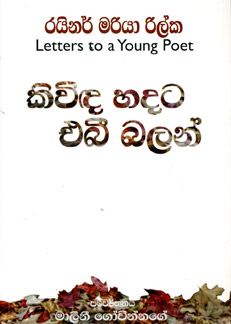Discovering Rilke in his letters
 When I received the Sinhala translation of Rainer Maria Rilke’s book
titled ‘Letters to a Young Poet’, which presumably had been available
for the first time as far back as 1934, I recalled my own period of
reading Rilke’s poetry in the 60s. My favourite book on Rilke,
translated into English from German, was titled ‘The selected Poetry of
Rainer Maria Rilke’ edited and translated by the English poet and
literary critic Stephen Spender. When I received the Sinhala translation of Rainer Maria Rilke’s book
titled ‘Letters to a Young Poet’, which presumably had been available
for the first time as far back as 1934, I recalled my own period of
reading Rilke’s poetry in the 60s. My favourite book on Rilke,
translated into English from German, was titled ‘The selected Poetry of
Rainer Maria Rilke’ edited and translated by the English poet and
literary critic Stephen Spender.
Though I had no chance of reading the original English work ‘Letters
to a Young Poet’ I found it quite stimulating to flip through the
Sinhala translation by Malini Govinnage, who happens to possess
sensitive experience in the translation process.
Govinnage’s version
The Sinhala translation of ‘Letters to Young Poet’ is called Kivinda
Handata Ebi Balan (Wijesuriya Grantha Kendraya 2010). Translator’s brief
preface provides a background to the study of Rilke and his poetic
works. This would have been written broadly to help Sinhala reader gauge
the value of Rilke in translation and his poetic works as assessed
elsewhere. The modern Sinhala reader and poet must know more about
Rilke’s creativity.
 Perhaps with this opening Govinnage could pave the way to the
translation of several selected poems of Rilke as done by Spender quoted
earlier. This volume contains ten of the letters sent by Rilke from time
to time despite his busy schedule of traveling and writing. The letters
are prefaced by a biography of Rilke (1875 – 1926) where the reader
gathers more facts pertaining to his growing up and stepping into the
creative functions devotedly. Perhaps with this opening Govinnage could pave the way to the
translation of several selected poems of Rilke as done by Spender quoted
earlier. This volume contains ten of the letters sent by Rilke from time
to time despite his busy schedule of traveling and writing. The letters
are prefaced by a biography of Rilke (1875 – 1926) where the reader
gathers more facts pertaining to his growing up and stepping into the
creative functions devotedly.
How Rilke grows up to be a man and undergoes all struggles in life
inclusive of army services and ill health and rest of the turbulences
had given way for him to be an ultra sensitive deranged personality. He
looks more like a saint than an ordinary human being. Recording of his
love and affection to his mother is quite touching. Later on he is shown
as a person who adheres to several isms like existentialism and
mysticism.
Impossible comparison
One is reminded of D H Lawrence’s life at times, though the
comparison is impossible considering each other’s creativity. This
volume of letters could have been detoured, perhaps by presenting a few
poems of Rilke selected at random. The translator Govinnage is too
honest and perhaps she could present a volume of translated poems of
Rilke later. This I feel could prove to be a companion volume to the
present attempt.
Rilke lived a brief span of life of 51 years. But on seeing his
collections of poetry and letters it’s indeed a surprise. These are
factors indicated in these letters as well. Rilke had drawn inspiration
from Greek mythology and religious sources (Apollo, Hermes and Orpheus).
Allusions recur in his poems titled as Euridice and Hermes. Rilke’s
little known 1898 poem is titled as ‘visions of Christ’ where Christ
himself visualizes Mary Magdalene as his mother who looked after him
fondly. Rilke wanted to visualize religious symbols as far as possible
in terms of socio religious expression.
It is also mentioned that Rilke increasingly had to struggle with his
health problems that necessitated many long stays in a sanatorium in
Geneva. At this place he had been engaged in writing some of his
outstanding poetic works. Most these factors are recorded with his own
epitaph poem which goes as follows:
Rose, oh pure contradiction,
Delight of being no one’s sleep
Under so many lids
Paradox of life
Literary critics such as Sepnder underlines that rose is a symbol
used by Rilke as a recurrent symbol. Strangely enough it is believed
that Rilke once tried to gather some roses from his garden. While doing
so he pricked his hand on a thorn. This small wound failed to heal. Day
by day it grew rapidly worse. Soon his entire arm was swollen and his
other arm became affected as well. So he died. Perhaps this may be an
anecdote woven around Rilke as he was so fond of roses.
I must thank and mention that Govinnage has embarked on a project
which to me deems necessary at a time when pseudo Sinhala critics praise
unworthy poetic efforts as remarkable contributions. This volume of
translated letters hints the necessity to rediscover sensitively what
this poet of the world express honestly from time to time, shredding off
their pretensions. Rilke’s is a wonderful example.
[email protected]
|



